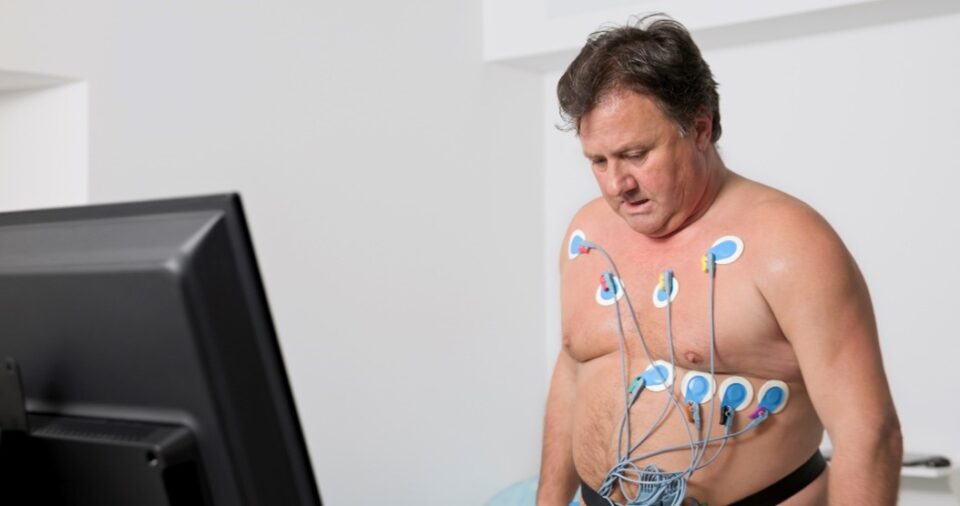Stress Testing Services in Sugar Land, TX
We Offer Stress Testing Services in Sugar Land, TX
Stress testing is critical in modern cardiology, helping specialists evaluate how the heart performs under pressure. That’s why Complete Cardiology Care proudly provides stress testing services in Sugar Land, TX. Our comprehensive stress testing tools allow us to diagnose, monitor, and improve our patients’ heart health. We encourage you to read further to learn about stress testing, its benefits, and how to prepare.
CONTACT US

What Is a Stress Test?
Stress tests are procedures used to measure how the heart functions during physical exertion or simulated stress conditions. The goal is to assess blood flow, identify irregularities, and detect potential cardiac issues. Stress tests are instrumental in diagnosing conditions like coronary artery disease, arrhythmias, and other heart-related problems.
Types of Stress Tests
There are several variations of cardiac stress testing, each tailored to meet specific diagnostic needs. The main types include:
Exercise Stress Test
This is the most common type of stress test. During an exercise stress test, you’ll walk on a treadmill or pedal a stationary bike while a doctor monitors your heart rate, blood pressure, and breathing. It determines how well your heart can handle increased physical activity.
Chemical (Pharmacologic) Stress Test
If you’re unable to exercise, we may recommend a chemical stress test. This test uses medications to mimic the effects of exercise by increasing blood flow to the heart. Common medications for this test include dobutamine and adenosine.
Stress Echocardiogram
This type of stress test combines exercise testing with ultrasound imaging. After you exercise or receive pharmacological stimulation, a technician will use ultrasound to create detailed images of your heart, showing how it pumps under stress.
Nuclear Stress Test
A nuclear stress test uses a small amount of radioactive material and specialized imaging to track blood flow to the heart. It provides precise images of areas that may not be receiving adequate blood supply.
Stress MRI
A stress MRI offers advanced imaging of the heart. It’s particularly useful for patients with complex cardiac conditions. This test may incorporate medication to stimulate stress and examine heart function and blood flow in greater detail.
Reasons You May Need a Stress Test
If you have a family history of heart disease or exhibit symptoms such as shortness of breath, fatigue, or lightheadedness, a stress test can be a valuable diagnostic tool. We may also recommend a stress test for reasons like:
- Assessing chest pain or discomfort
- Diagnosing coronary artery disease or arrhythmias
- Monitoring heart conditions and response to treatment
- Evaluating potential heart damage post-heart attack
- Guiding exercise programs for heart rehabilitation
Stress Test Procedure Overview
We understand you’ll want to know what happens during a stress test before participating. We’re happy to share all the details of your test during a consultation, but a typical stress test includes these key steps:
- Preparation – We’ll attach electrodes to your chest to monitor heart function. You’ll also wear a blood pressure cuff to track your pressure throughout the test.
- Stimulation – Depending on the type of test, you may exercise on a treadmill, pedal on a bike, or receive medication to stimulate physical stress.
- Monitoring and Imaging – Our team will evaluate your heart rate, blood pressure, and oxygen levels. We may also use advanced imaging tools for additional insights.
- Cool Down – After the test, we’ll closely monitor your vital signs until you return to a baseline state.
Benefits of Stress Testing
Stress testing offers a range of benefits. Among them are:
- Early Detection – Assessing signs of coronary artery disease or other heart conditions early allows for timely intervention.
- Guided Treatment Plans – Results will help our medical professionals tailor treatments to your needs.
- Improved Monitoring – Stress tests allow doctors to track the effectiveness of ongoing medications and treatments.
- Enhanced Heart Health – We’ll learn valuable information to support proactive heart health management.
Risks and Considerations for Stress Testing
Stress tests are generally safe. But like most medical procedures, they carry some risks. These include irregular heart rhythms, dizziness, or low blood pressure during the test. However, these occurrences are rare. Furthermore, your stress test will be conducted under close supervision by our trained medical staff to ensure your safety.
Tips to Prepare for Your Stress Test
Proper preparation can make your stress test more effective and comfortable. Here are our tips to prepare for your stress test:
- Clothing – Wear loose, comfortable clothes and sturdy shoes for exercise-based tests.
- Medications – Follow your doctor’s instructions on any medications you should avoid or continue before the test.
- Diet – Avoid heavy meals, caffeine, and alcohol for three to four hours before your test.
- Bring Essentials – Make sure to bring a list of current medications and any medical records your doctor may need.
Understanding Test Results
The results from a stress test will indicate whether your heart is functioning well or if further evaluation is necessary. We’ll always explain your results in detail and recommend next steps, but common findings include:
- Normal Results – Blood flow and heart function appear normal during activity.
- Abnormal Results – Reduced blood flow or irregular rhythms may suggest a need for additional testing or treatment adjustments.
Contact Our Expert Cardiologists Today
Stress testing is a powerful tool for understanding and improving your heart health. At Complete Cardiology Care in Sugar Land, TX, we’re dedicated to providing state-of-the-art stress testing services. Whether you need a basic exercise stress test or advanced imaging from a nuclear stress test, we’ll deliver the best care possible for your heart. Contact us today to schedule an appointment.
